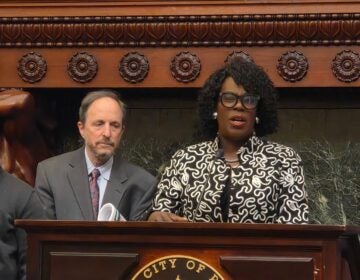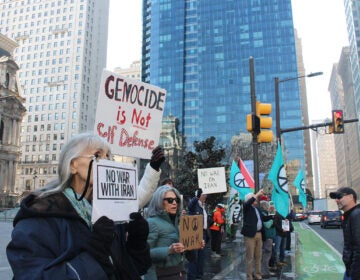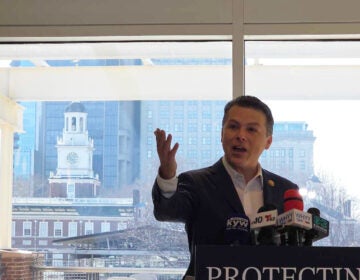Councilwoman offers strategies to phase out tax abatement on Philly development
Councilwoman Helen Gym wants to shrink the 10-year tax-abatement and steer more money to the Philadelphia School District.

Philadelphia Councilmember Helen Gym. (Emma Lee/WHYY)
Philadelphia Councilwoman Helen Gym introduced two bills to reform the city’s controversial 10-year property tax abatement on Thursday, saying that she believes policy change is imminent.
Gym said the goal is to funnel more money to the schools by curtailing the 10-year tax exemption on new construction.
“With the introduction of these bills…we have all the options on the table for engaging in a thoughtful reform of the one the city’s most generous tax subsidies,” said Gym.
The first bill introduced by the progressive at-large councilwoman would phase out the abatement over 10 years. In the first year all of the assessed costs would be exempted from property taxes, followed by 90 percent in the second year, 80 percent in the third year, and so on. Gym described this option as the most moderate reform, with the least potential effect on development.
The second bill would cap the total amount of the assessment not to “exceed the Federal Housing Administration mortgage limit for a one-family dwelling in Philadelphia County.” Only residential abatements would be affected, because of concerns about discouraging commercial development in a city with hundreds of thousands of unemployed or underemployed people.
Last year Gym introduced legislation that would get rid of the abatement on the 55 percent of every property tax dollar that goes to the School District of Philadelphia, essentially halving the value of the tax break. She also called for hearings on limiting the abatement by geography, floating the idea of keeping the abatement in distressed neighborhoods but ending it in booming areas like Center City or Fishtown.
“The tax abatement was largely introduced and defined as one that dealt with blighted properties,” said Gym. “There’s an opportunity to look at restricting the tax abatement to areas that are truly blighted, rather than have it apply citywide.”
Gym also co-sponsored a bill introduced by Councilwoman Cindy Bass, which would eliminate the property tax abatement entirely.
“It’s a conversation that will move through City Council this session and we want to make sure we have all the legislative options on the table,” said Gym. “The tax abatement needs to evolve.”
Council President Darrell Clarke said that reform of the abatement needs to be part of a larger conversation about development in the city.
“If we are going to alter the tax abatement, if there is any revenue generated from changing the tax abatement, then that revenue should go towards a particular need [like] the School District or affordable housing,” said Clarke. “But I’m real clear that I don’t think the city of Philadelphia needs to continue a 10-year, 100 percent property tax abatement.”
First enacted in the early 2000s, real estate industry advocates argue that the 10-year tax break spurred much of the new development in Philadelphia during the intervening years. They say that it counterbalances Philadelphia’s high construction costs, which would otherwise make it less profitable to invest in a market that does not command the high rents of a New York or San Francisco.
But critics have said that development in Philadelphia no longer requires such a generous incentive if it ever did. In particular, activists with groups like Our City, Our Schools and the Caucus of Working Educators say that the abatement robs the perennially cash-strapped school district of much-needed funds.
Neighborhood groups have also spoken against the abatement, saying that it exacerbates tensions between longtime residents — who are paying their property taxes — and newer residents, sometimes in larger houses, who do not have to.
Despite these criticisms, the abatement was largely seen as sacrosanct until last year, when many city power players — including the building trades unions came out in favor of reform.
As the mayor and City Council members run for new terms this year, Gym’s proposals fit an election-year pattern of finding ways to provide more funding for city schools without passing an across-the-board tax hike.
—
Tom MacDonald contributed reporting.
WHYY is your source for fact-based, in-depth journalism and information. As a nonprofit organization, we rely on financial support from readers like you. Please give today.







